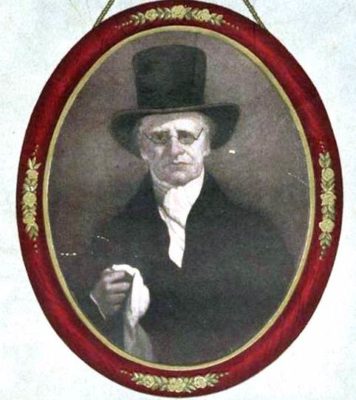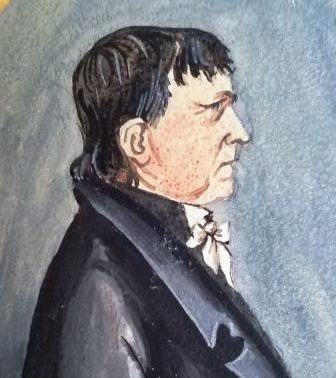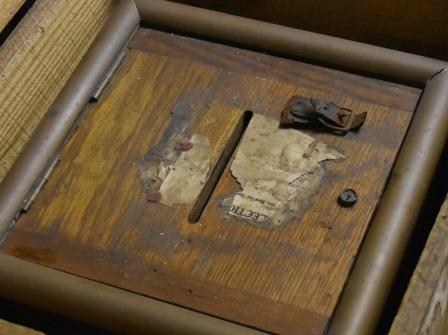Hard-Hitting Early 19th Century Politics
With another election season upon us, attention once again is focused on the tone of political discourse in the United States. These concerns are not new, however, as politics has been almost a full-contact sport since our nation’s founding. The Shrivers who founded the Union Mills Homestead took center stage in some of the most brutal political battles of the early 19th century. This topic will be one of those addressed in a Carroll County Public Library Program to be held March 17 & March 19, 2020.
Political Parties in the Early 1800s
Although political parties were not spelled out in our nation’s founding documents, competition for votes spurred the development of antagonistic political interests from almost the very beginning. At the turn of the nineteenth century, the United States was split between two political parties – the Federalists and the Democratic-Republicans, often just called Republicans. The Federalists were generally more aligned with the wealthy and business interests and the Republicans were more aligned with farmers and workers.
Political dialog back then was strained, to say the least — both nationally and in Maryland. Republicans noted in a Frederick newspaper “incontestable proof of the designs of this Federal Faction to overturn our present form of Government, and build a Monarchy on its ruins.” In the Frederick-Town Herald, a Federalist paper, an 1802 piece mocked Thomas Jefferson’s promise “to restore harmony to social intercourse” and “to consider Americans as “all Federalists and all Republicans,” declaring that “[i]nstead of the smiling aspect of harmony we behold the Demon of Discord in all his horrors.” Sound familiar?
The Shrivers Wield a Political Sword: German-Language Media
After brothers Andrew and David Shriver founded Union Mills in 1797, the Shriver family became immersed in the barbed political debates of the time. The Shrivers and their father, David Shriver, Sr., were descendants of German immigrants and led a strong German political bloc in the area. A large part of the population in what is now Carroll County were German-speaking farmers who depended on Frederick newspapers to get their news.

Abraham Shriver, brother of the founders of Union Mills
In 1802, another Shriver brother, Abraham, collaborated with Frederick publisher Mathias Bartgis to publish the Hornet — a newspaper dedicated to the Republican cause. Knowing the audience, Bartgis published the paper in both English and German. Abraham Shriver wrote the political content and had his brother Andrew translate the pieces into German. The paper became known for its aggressive political features, with a slogan “To true Republicans I will sing, but aristocrats shall feel my sting!” Republicans also published handbills in English and in German. Federalists complained that German-language materials published by the local Republicans were different from the English ones, “containing the most barefaced and outrageous falsehoods.”
The Frederick newspapers in that era pulled no punches. In June, 1802, the Herald flatly called the local Republicans “traitors” who were poisoning “the fountains of Government.” A few months later, the Herald called Andrew Shriver “the democratic dictator of the Levy Court.”

The masthead of the Hornet, a Frederick newspaper in the early 1800s.
The 1803 Election
Bartgis became concerned as the political attacks the Shrivers published in the Hornet became more extreme. In 1803, Abraham Shriver started working with a new publisher, John Colvin, who published the Republican Advocate in Frederick.

Maryland Senator David Shriver, Sr., 1835-1826, father of the brothers who founded Union Mills
In the fall of 1803, the Shrivers’ father, David Shriver, Sr., was on the ballot for House of Delegates. Among his opponents was Roger Brooke Taney, who would eventually become Chief Justice of the United States. In the lead-up to the election, the Republican Advocate accused Taney of leading a “cavalcade” of Federalists into Frederick “in a most riotous manner” where at the Court House they “through intoxication or design vomited forth a thousand curses against the republicans and violently assaulted and most shamelessly proceeded to beat a respectable young German.”
Taney had recently moved to Frederick County and was making his first attempt at elected office. The Republicans questioned why he had been run out of Calvert County and attacked him unmercifully, calling him (among other things) a “bladder of wind.”
Class Warfare
The 1803 election devolved into unvarnished class warfare in the local papers. The Advocate chastised the “rich and purse-proud aristocrats” who were attempting to “influence or over-awe the Republicans, who in general consist of mechanics, plain Dutch farmers, and men in middling stations in life.”
Just days before the election, the Advocate accused Charles Carroll of Carrollton, “that hoary headed aristocrat,” of attempting to sway votes in favor of the Federalists. The Advocate asked, “[s]hall the people be dictated to by this lordly nabob… [h]as he more virtue, more honor, or more honesty, than a good, industrious farmer? Dares he, with his British monarchical and artistocratical politics, come into Frederick county to cajole, to swindle the people out of their rights… Citizens of Frederick county, set Charles Carroll at defiance.”
The Republicans (including David Shriver, Sr.) went on to win the election in 1803, proudly claiming that their efforts in expanding voting rights led to the victory. The Republicans crowed, “The neck of Federalism is broken in Frederick County and the beast is dying meanwhile it groans tremendously.”
No doubt there were calls to “restore harmony” to political discussion back in the early 1800s. Such wishful thinking still echoes over 200 years later.
“Revisiting the Founding Era” Program
Event: “We the People: America’s Founding Visions”
Date: May 5, 2020
Description: This online program involves a panel discussion about America’s founding visions as exemplified by key documents and local historical figures. The panel is moderated by Judge Joe Getty of the Maryland Court of Appeals, a former Union Mills Homestead Board member.
Event: “Revisiting the Founding Era, Part II”
Date: October 21, 2020
Description: Revisiting the Founding Era uses historical documents to spark conversation about the Founding Era’s enduring ideas and themes and encourage understanding and appreciation of the time period and how they influence our lives today. This program examines the early issues in governing the State of Maryland and the crafting of Maryland’s first constitution in 1776. The program was supported by a grant from the Gilder Lehrman Institute of American History and the American Library Association through the “Revisiting the Founding Era” program (foundingera.org) A Learning Advantage Partnership and Celebrating America Program.
For more information on the original programming, prior to COVID-19: https://ccpl.librarymarket.com/events/we-people-americas-founding-visions

